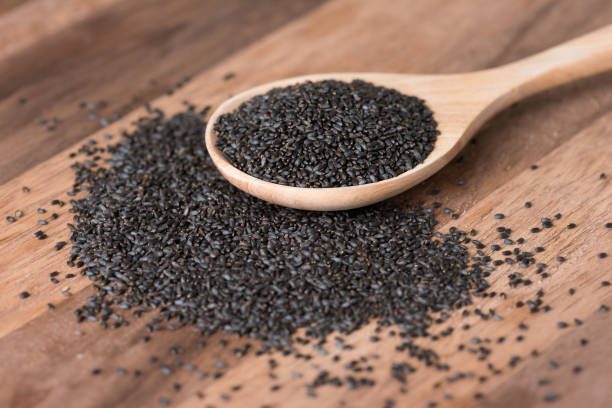بذور الريحان Basil Seeds
Basil is a herbaceous plant grown in many parts of the world, and is known for its aromatic and distinctive flavor that adds a delicious taste to foods. Basil is mainly grown in tropical and temperate regions. Basil leaves are widely used in cooking, while its seeds remain rarely used despite their great benefits.
Type: Seeds
Nutritional components of basil seeds:
Basil seeds contain many nutrients that make them beneficial to health. The most prominent of these components are:
Antioxidants: Basil seeds contain antioxidant compounds that fight free radicals, which contributes to the prevention of chronic diseases.
Fatty acids: especially unsaturated fatty acids such as omega-3, which contribute to improving heart health.
Fiber: Fiber helps improve digestion and regulate bowel movements.
Vitamins and minerals: Basil seeds contain vitamins such as vitamin A, vitamin K, and vitamin C, in addition to minerals such as calcium, magnesium, and iron.
Benefits:
Improves digestion: Basil seeds are rich in fiber, which helps improve digestion and regulate bowel movements. They may also help relieve symptoms of bloating and constipation.
Promotes heart health: Basil seeds contain healthy fatty acids such as omega-3, which help reduce harmful cholesterol levels in the blood, thus reducing the risk of heart and artery diseases.
Strengthening immunity: Basil seeds contain antioxidants and antibacterial and antiviral substances, which enhance the immune system and help the body fight diseases and infections.
Controlling blood sugar levels: Some studies suggest that basil seeds may help regulate blood sugar levels, making them beneficial for people with or at risk of diabetes.
Anti-inflammatory: Basil seeds contain anti-inflammatory compounds, which help reduce swelling and redness in the body, and can be used to treat some inflammatory diseases such as arthritis.
Promote skin health: Basil seeds can be used to improve skin health. They contain antibacterial and antiseptic properties, which help reduce acne and skin irritation.
Reducing stress levels: Basil seeds help relieve stress and anxiety thanks to their calming effect on the nervous system, and can be used as a natural aid to relaxation and good sleep.
Uses:
In cooking: Basil seeds can be added to foods to give them a distinctive flavor, as they can be used in preparing oriental and international dishes such as salads, soups, and grills.
In preparing drinks: Basil seeds are used in preparing drinks such as basil lemonade or iced basil drink. Basil seeds can also be soaked in water for a few hours before drinking it to obtain additional health benefits.
In making basil oil: Basil essential oil is extracted from its seeds, which is used in skin and hair care thanks to its antibacterial and antiseptic properties.
In natural remedies: Basil seeds can be used to treat many health conditions such as cough or sore throat, and basil seed tea is a popular remedy for many digestive disorders.
Despite the many benefits of basil seeds, there are some precautions that should be taken into consideration:
Allergy: Some people may be allergic to basil seeds, so it is important to be careful when using them for the first time.
Interaction with medications: Basil seeds may interact with some medications such as blood sugar regulating medications or blood thinners, so you should consult your doctor before using them if you are taking certain medications.
Export Details Worldwide:
Weight: 20 or 25 kilograms
Packaging: Automated
Packaging Type: Bags
Container: 20 feet
Origin: Egypt

